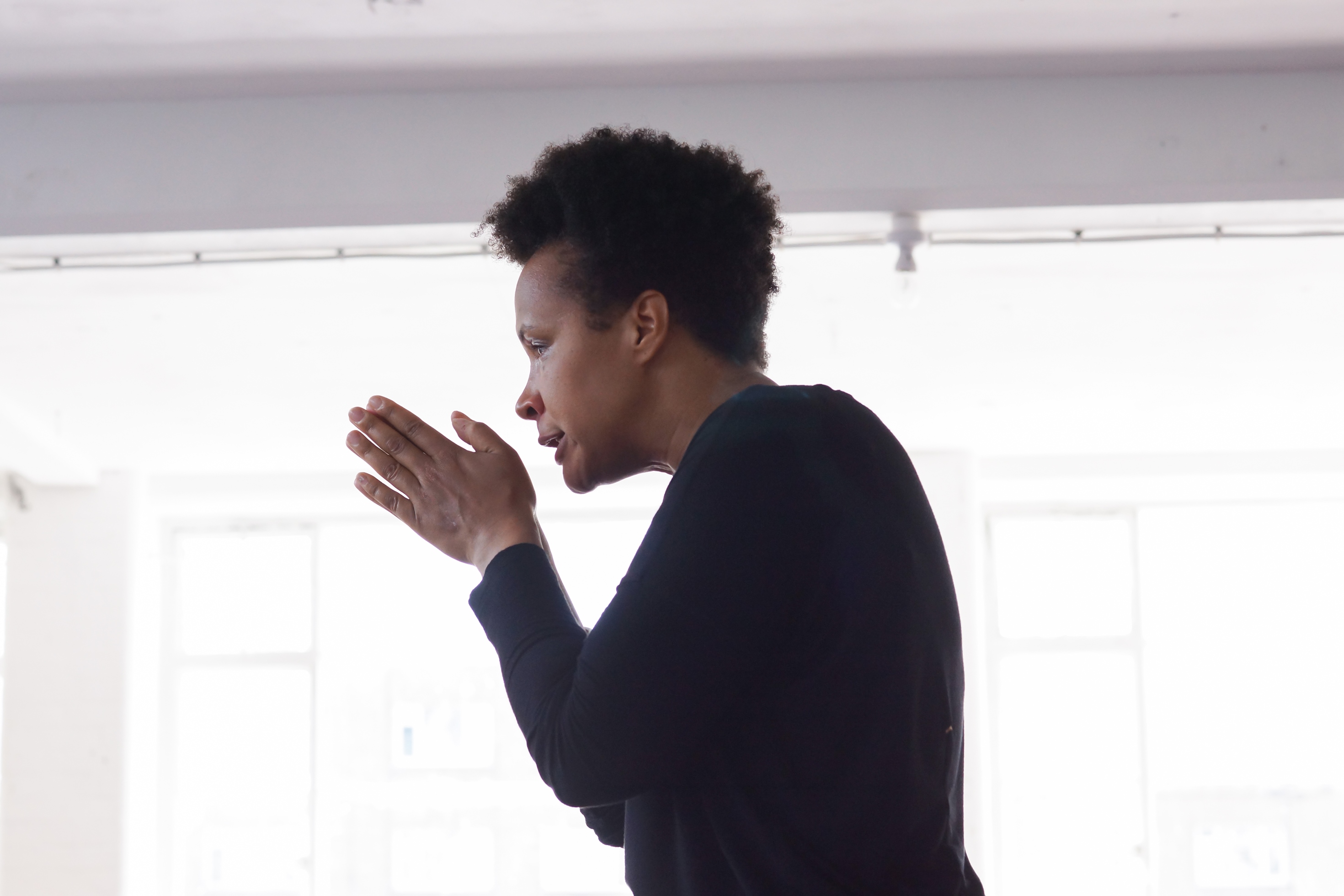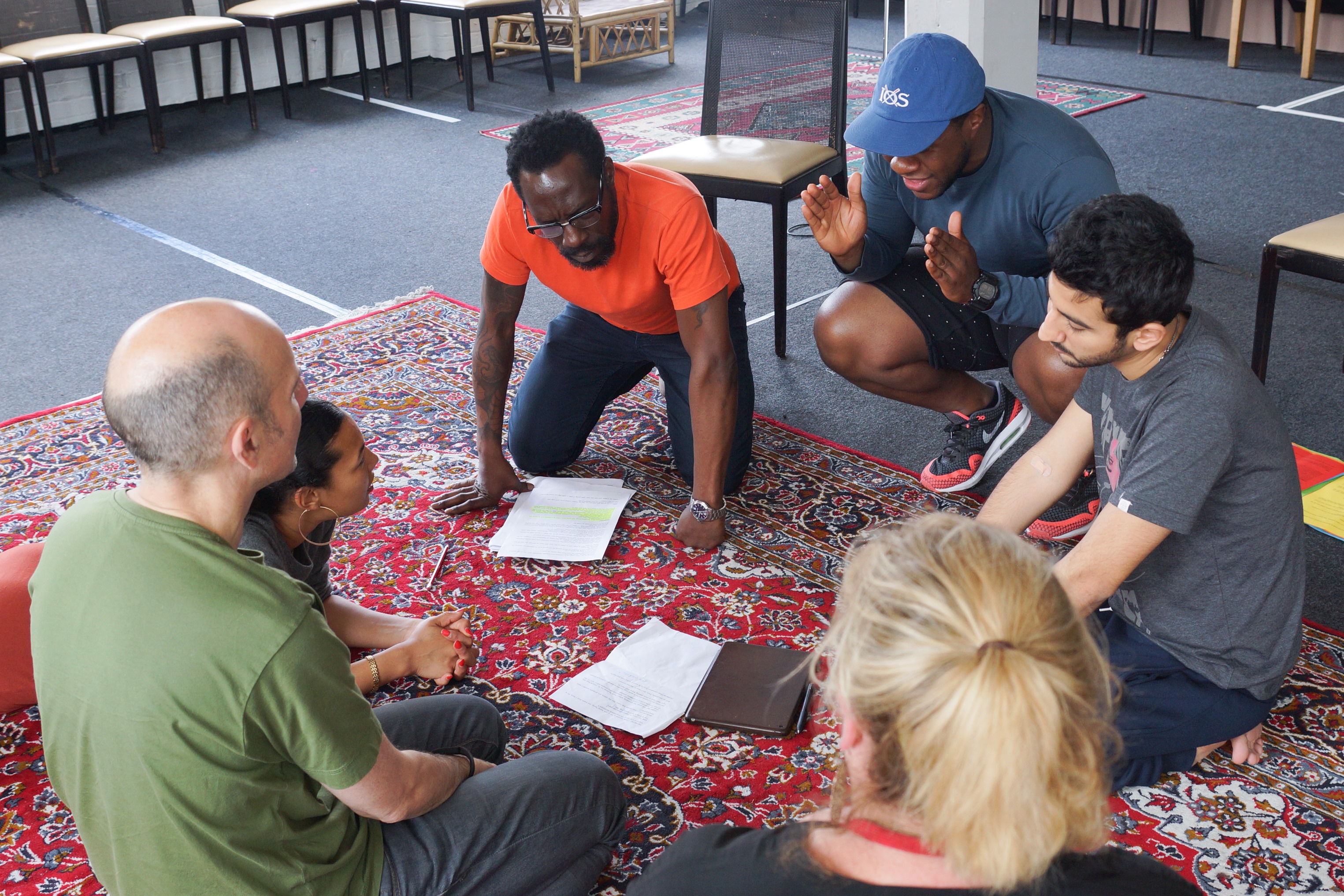“Back home, being gay, you’re the lowest of the low. You’re a dog. A Jamaican dog.”
– Desmond Jolly
Three empty chairs in a dark room, enclosed by roughly nailed together chipboards. This is the setting for the first part of ‘Now We Are Here’, a play at The Young Vic in London, United Kingdom, which intertwines the true stories of three refugees living in Britain.
The sparse set belies the richness of the three narratives that make up the performance. Written by refugees Desmond Jolly, Mir Ahmed and Michael Mugishangyezi, ‘Now We Are Here’ relates the heartbreaking struggle each has gone through to escape war, forced marriage, homophobia and persecution.“I was a weak faggot child. A dishonour to the family. That really broke me, smashed me into pieces. But I stayed silent.” – Mir Ahmed
The second part of the play is made up of a single monologue by Tamara McFarlane, a Jamaican lesbian who sees a lynch-mob attack on a gay boy in her community and is wracked with fear that she will meet a similar fate. The story, which plaits together tragedy, love and trauma, is beautifully performed by actress Golda Rosheuvel.
“By the time I was a teenager, I had mastered the art of hiding who I really was. Will the people in the community chop us into pieces? Will they burn us alive together?” – Tamara McFarlane
‘Now We Are Here’ is a production created by Taking Part, a programme at The Young Vic that runs a range of skills-based workshops, engaging with over 10,000 young people every year. Speaking to the IPF, the Director of Taking Part, Imogen Brodie, explained how the play was the result of over a year’s collaboration between the refugees, poet Deanna Rodger and Director Ian Rickson.
“All of the words are directly from the people who have written it, the refugee writers,” she said. “That’s either through conversation, through interviews or through writing exercises. Then we structured it to give it a narrative arc. It was all about trying to create the richest version of their stories that we could.”
“My uncle told me, ‘You’re having an affair with a guy. You’re retarded.’ They beat me over and over.” – Mir Ahmed
A defining feature of the play is its focus on the LGBTI experience. It details the physical and psychological damage of ostracisation, from the shock that Desmond feels after being threatened by his family, to the listless existence Mir is forced to live, drugged in a Pakistani mental institution.
“The issues that are raised in the play are a lot about sexuality, and about the persecution of homosexuality in different countries,” said Imogen. “It doesn’t always have to be a war that forces somebody out of their home. It can also be bigotry and aggression.”
One striking question that the play evokes is, what of the lives of refugees once they reach Britain? Michael describes how hunger is a daily battle, how he crosses the road to avoid the pain of passing by kebab shops, and the enduring loneliness that being a refugee brings.
“I look at bread, and it has no meaning. I have no family to take it to.” – Michael Mugishangyezi
While they may no longer fear sexual persecution, each narrative touches on just how vulnerable they still are, financially and emotionally. Their lives, played out on the doorsteps of ordinary Britons, remain a struggle to survive and are all the more devastating because they go almost entirely unnoticed.
“Try to develop a shield. Try not to feel pain… I don’t even have a card to show who I am.” – Michael Mugishangyezi
According to Taking Part, ‘Now We Are Here’ provided an opportunity to create a meaningful exchange between the wider public and those who have experienced what it’s like to have refugee status in Britain.
“If you’re in a marginalised group, all you ever feel like is that you’re asking people for stuff, and you never feel like they need you back,” explained Imogen. “But actually, we couldn’t have made this play without them. There was a real exchange going on, which felt really positive.
“I don’t think I’ve ever seen on stage a black lesbian story, ever. I’m glad that we’re doing it. It does feel like a genuine, unheard story.”
For more information about Now We Are Here, visit The Young Vic website. To learn more about organisations supporting LGBTI refugees in the UK, visit Micro Rainbow International, Room to Heal and NNLS Destitute Asylum Seekers Drop In.




